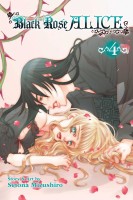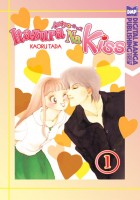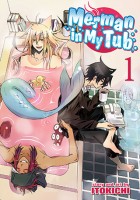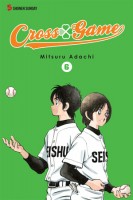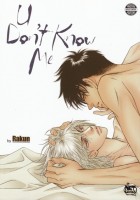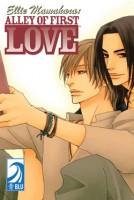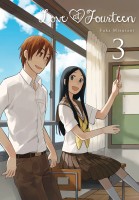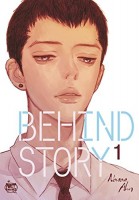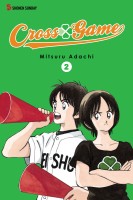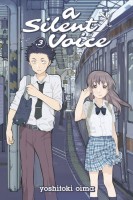For the last couple of years, I have made a point to compile an end-of-year list of works that, for me, were particularly notable. In general I tend to like making lists, but I particularly enjoy working on this one because it specifically provides me the opportunity to reflect back on the year. The notable list isn’t exactly a “best of” list or even a list of favorites. To be included, a work must simply have been released in 2015, read in 2015, and stood out to me in one way or another. (That being said, I didn’t get to read as much this past year as I have in previous years. I’m sure that, had I had the chance to read them, there would be other works represented here, too.)
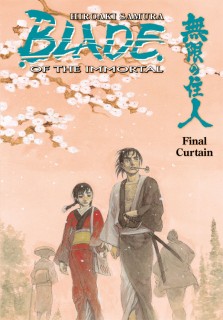 2015 was a year in which many series came to an end. Final Curtain, the last volume in the English-language edition of Hiroaki Samura’s Blade of the Immortal, was especially meaningful to me since the series was one of the first manga that I ever read and continues to be a personal favorite. Dark Horse began releasing the series in individual issues back in 1996; nearly two decades later it is now available in its entirety. All in all, it was a great ending to a great series.
2015 was a year in which many series came to an end. Final Curtain, the last volume in the English-language edition of Hiroaki Samura’s Blade of the Immortal, was especially meaningful to me since the series was one of the first manga that I ever read and continues to be a personal favorite. Dark Horse began releasing the series in individual issues back in 1996; nearly two decades later it is now available in its entirety. All in all, it was a great ending to a great series.
 Another series that concluded in English in 2015 was The Summit of the Gods, written by Baku Yumemakura and illustrated by Jiro Taniguchi. Fanfare/Ponent Mon is one of the smaller, more niche manga and comics publishers and has infrequent releases. Multiple years passed between the publication of some of the volumes in the series, so I was honestly afraid I’d never have the opportunity to read the conclusion of such an impressively drawn and written manga.
Another series that concluded in English in 2015 was The Summit of the Gods, written by Baku Yumemakura and illustrated by Jiro Taniguchi. Fanfare/Ponent Mon is one of the smaller, more niche manga and comics publishers and has infrequent releases. Multiple years passed between the publication of some of the volumes in the series, so I was honestly afraid I’d never have the opportunity to read the conclusion of such an impressively drawn and written manga.
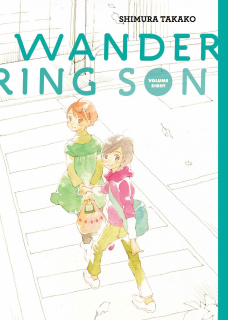 2015 also saw what may be the premature end to a few manga in English. Tragically, for a variety of reasons, Fantagraphic’s release of Takako Shimura’s Wandering Son hasn’t been doing well and the publisher might have to cancel the series if sales don’t improve. Only a single volume, with one heck of a cliffhanger, was able to be released in 2015. The series is incredibly important to me on a very personal level—it was literally life-changing—so I’ll heartbroken if this is truly the end.
2015 also saw what may be the premature end to a few manga in English. Tragically, for a variety of reasons, Fantagraphic’s release of Takako Shimura’s Wandering Son hasn’t been doing well and the publisher might have to cancel the series if sales don’t improve. Only a single volume, with one heck of a cliffhanger, was able to be released in 2015. The series is incredibly important to me on a very personal level—it was literally life-changing—so I’ll heartbroken if this is truly the end.
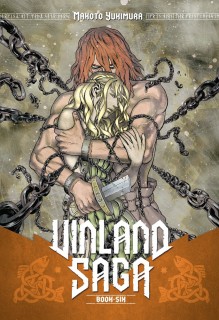 Makoto Yukimura’s Vinland Saga is another series that might come to a close before its time in English. After a temporary hiatus, the sixth and seventh omnibuses, the last that are guaranteed to be published, were released in 2015. Even if the rest of the series isn’t translated (and I hope that it is), the first two major story arcs are complete and the manga is well-worth seeking out. The character development in the series is fantastic, the artwork is excellent, and the story is marvelous.
Makoto Yukimura’s Vinland Saga is another series that might come to a close before its time in English. After a temporary hiatus, the sixth and seventh omnibuses, the last that are guaranteed to be published, were released in 2015. Even if the rest of the series isn’t translated (and I hope that it is), the first two major story arcs are complete and the manga is well-worth seeking out. The character development in the series is fantastic, the artwork is excellent, and the story is marvelous.
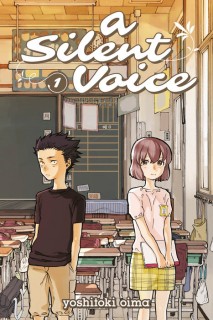 One of the manga to debut in 2015 that stood out to me the most was A Silent Voice by Yoshitoki Oima. A realistic portrayal of bullying and the consequences of such cruelty, the series can be a difficult but ultimately worthwhile read. The subject matter is heartwrenching but handled extremely well, skillfully showing the nuanced complexity of human nature and relationships while exploring themes of forgiveness, empathy, and redemption.
One of the manga to debut in 2015 that stood out to me the most was A Silent Voice by Yoshitoki Oima. A realistic portrayal of bullying and the consequences of such cruelty, the series can be a difficult but ultimately worthwhile read. The subject matter is heartwrenching but handled extremely well, skillfully showing the nuanced complexity of human nature and relationships while exploring themes of forgiveness, empathy, and redemption.
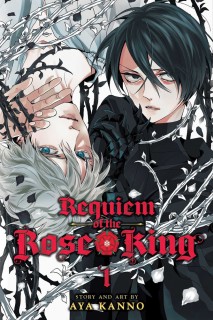 Aya Kanno’s Requiem of the Rose King was one of my most anticipated manga series to be released in 2015. A combination of historical fact and historical fantasy inspired by the plays of William Shakespeare, Kanno’s research into the Wars of the Roses, and her own imagination, the manga hasn’t yet disappointed me and gets better with each volume. The storytelling can be somewhat cryptic and chaotic at times, but its dark, dreamlike nature can also be wonderfully effective.
Aya Kanno’s Requiem of the Rose King was one of my most anticipated manga series to be released in 2015. A combination of historical fact and historical fantasy inspired by the plays of William Shakespeare, Kanno’s research into the Wars of the Roses, and her own imagination, the manga hasn’t yet disappointed me and gets better with each volume. The storytelling can be somewhat cryptic and chaotic at times, but its dark, dreamlike nature can also be wonderfully effective.
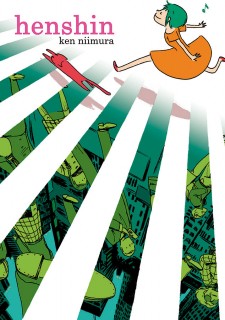 Ken Niimura is an award-winning Spanish comics creator of Japanese heritage who has worked in the European, North American, and Asian markets. Henshin is a delightfully quirky collection of thirteen short manga originally released online by Ikki, making it Niimura’s first major Japanese publication. While the stories range from semi-autobiographical to the absolute fantastic, they all tend to have surprising twists to them with great emotional impact.
Ken Niimura is an award-winning Spanish comics creator of Japanese heritage who has worked in the European, North American, and Asian markets. Henshin is a delightfully quirky collection of thirteen short manga originally released online by Ikki, making it Niimura’s first major Japanese publication. While the stories range from semi-autobiographical to the absolute fantastic, they all tend to have surprising twists to them with great emotional impact.
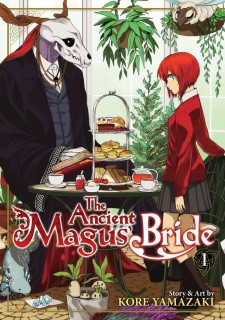 Seven Seas has recently shown a remarkable increase in the number and variety of titles it has licensed. Kore Yamazaki’s The Ancient Magus’ Bride is perhaps one of Seven Sea’s more atypical series, but it seems to be doing well for itself. I’m glad, because I enjoy the manga and its strangeness immensely. A peculiar romance incorporating horror and fantasy, magic and science, the series is heavily influenced by European legends, fairy tales, and folklore.
Seven Seas has recently shown a remarkable increase in the number and variety of titles it has licensed. Kore Yamazaki’s The Ancient Magus’ Bride is perhaps one of Seven Sea’s more atypical series, but it seems to be doing well for itself. I’m glad, because I enjoy the manga and its strangeness immensely. A peculiar romance incorporating horror and fantasy, magic and science, the series is heavily influenced by European legends, fairy tales, and folklore.
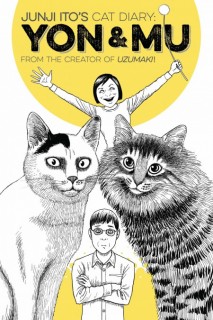 Junji Ito had a pretty good showing in English in 2015 with several new releases and re-releases. Of those, it was Junji Ito’s Cat Diary: Yon & Mu that made the strongest impression on me. (I admittedly find it difficult to resist cat comics.) The manga is drawn in Ito’s signature style but is undoubtedly a comedy, granted one about the horrors and anxieties of pet ownership. The disconnect between the artwork and the story makes it even funnier.
Junji Ito had a pretty good showing in English in 2015 with several new releases and re-releases. Of those, it was Junji Ito’s Cat Diary: Yon & Mu that made the strongest impression on me. (I admittedly find it difficult to resist cat comics.) The manga is drawn in Ito’s signature style but is undoubtedly a comedy, granted one about the horrors and anxieties of pet ownership. The disconnect between the artwork and the story makes it even funnier.
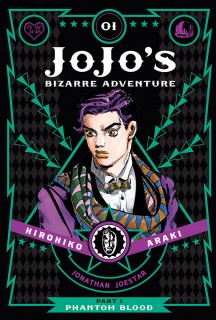 I never expected to see the beginning of Hirohiko Araki’s exceptionally weird yet iconic manga series JoJo’s Bizarre Adventure released in English. The third story arc was published years ago but only garnered a relatively small following. Thankfully, the manga’s recent anime adaptation revitalized interest in the series, leading Viz Media to release the first two arcs of the epic—Phantom Blood and Battle Tendency—and in a beautiful hardcover edition no less.
I never expected to see the beginning of Hirohiko Araki’s exceptionally weird yet iconic manga series JoJo’s Bizarre Adventure released in English. The third story arc was published years ago but only garnered a relatively small following. Thankfully, the manga’s recent anime adaptation revitalized interest in the series, leading Viz Media to release the first two arcs of the epic—Phantom Blood and Battle Tendency—and in a beautiful hardcover edition no less.
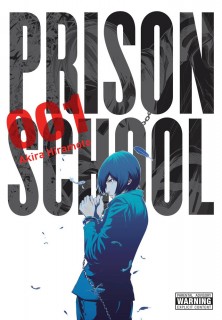 Probably one of the most divisive debuts of 2015 was Prison School by Akira Hiramoto, but Yen Press had the guts to license it. With its highly sexualized content, over-the-top fanservice verging on the grotesque, and preponderance despicable characters, it’s definitely not a series for everyone. The manga revels in its salaciousness to the point of parody, making it a strangely engrossing and humorous work for readers who aren’t immediately offended by it.
Probably one of the most divisive debuts of 2015 was Prison School by Akira Hiramoto, but Yen Press had the guts to license it. With its highly sexualized content, over-the-top fanservice verging on the grotesque, and preponderance despicable characters, it’s definitely not a series for everyone. The manga revels in its salaciousness to the point of parody, making it a strangely engrossing and humorous work for readers who aren’t immediately offended by it.
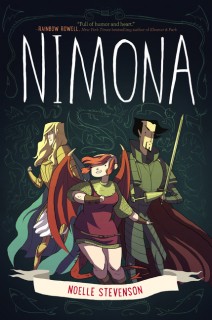 Nimona had its beginnings as an award-winning webcomic, ultimately becoming Noelle Stevenson’s debut graphic novel; the print edition also includes additional material not found online. I absolutely loved this comic. It starts out rather lighthearted, but as the graphic novel progresses it becomes more serious. However, it never loses its sense of humor. Stevenson combines colorful characters, settings, and artwork to create a comic that is both entertaining and meaningful.
Nimona had its beginnings as an award-winning webcomic, ultimately becoming Noelle Stevenson’s debut graphic novel; the print edition also includes additional material not found online. I absolutely loved this comic. It starts out rather lighthearted, but as the graphic novel progresses it becomes more serious. However, it never loses its sense of humor. Stevenson combines colorful characters, settings, and artwork to create a comic that is both entertaining and meaningful.
 Sometimes all I want from a comic is something fun, and Fantasy Sports by Sam Bosma is certainly that and then some. The comic started as a short, self-published, black-and-white work but it has been expanded into an ongoing, full-color series being released by Nobrow Press. The marvelous first volume, featuring a life-and-death game of basketball between an ancient mummy and a young magic user interning at the United Order of Mages, is filled with silliness and adventure.
Sometimes all I want from a comic is something fun, and Fantasy Sports by Sam Bosma is certainly that and then some. The comic started as a short, self-published, black-and-white work but it has been expanded into an ongoing, full-color series being released by Nobrow Press. The marvelous first volume, featuring a life-and-death game of basketball between an ancient mummy and a young magic user interning at the United Order of Mages, is filled with silliness and adventure.
 Also originally self-published, Towerkind by Kat Verhoeven was a comic that I came across by chance more than anything else; I picked up the book on an impulse after seeing it at the Toronto Comic Arts Festival and finding myself oddly drawn towards it. The comic is surreal, about a group of children with supernatural abilities who may or may not be facing the end of the world. It’s both a strangely compelling and darkly ominous work.
Also originally self-published, Towerkind by Kat Verhoeven was a comic that I came across by chance more than anything else; I picked up the book on an impulse after seeing it at the Toronto Comic Arts Festival and finding myself oddly drawn towards it. The comic is surreal, about a group of children with supernatural abilities who may or may not be facing the end of the world. It’s both a strangely compelling and darkly ominous work.
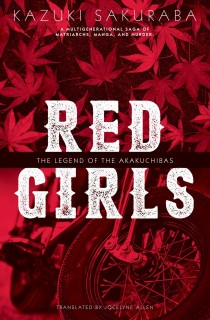 Out of all of the novels released in 2015 that I read, Red Girls: The Legend of the Akakuchibas by Kazuki Sakuraba was perhaps the most curious, peculiar, and enthralling. A multi-generational family epic, the story follows the lives and legends of three women, each powerful in their own way. (One of them even becomes a successful mangaka after retiring from being the leader of a girl gang.) Part history, part mystery, and part fantasy, I enjoyed the novel a great deal.
Out of all of the novels released in 2015 that I read, Red Girls: The Legend of the Akakuchibas by Kazuki Sakuraba was perhaps the most curious, peculiar, and enthralling. A multi-generational family epic, the story follows the lives and legends of three women, each powerful in their own way. (One of them even becomes a successful mangaka after retiring from being the leader of a girl gang.) Part history, part mystery, and part fantasy, I enjoyed the novel a great deal.
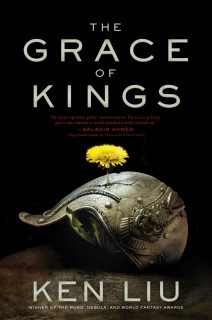 Ken Liu is probably best known for his short fiction, but in 2015 he made his debut as a novelist with The Grace of Kings, the first book in The Dandelion Dynasty which is a sort of retelling or reimagining of China’s historical legends and mythologies. The novel is a massive and expansive work with incredible worldbuilding. Though contemporary fantasy fiction, stylistically Liu also pays tribute to the narrative structure of the Chinese classics and not just their stories.
Ken Liu is probably best known for his short fiction, but in 2015 he made his debut as a novelist with The Grace of Kings, the first book in The Dandelion Dynasty which is a sort of retelling or reimagining of China’s historical legends and mythologies. The novel is a massive and expansive work with incredible worldbuilding. Though contemporary fantasy fiction, stylistically Liu also pays tribute to the narrative structure of the Chinese classics and not just their stories.

